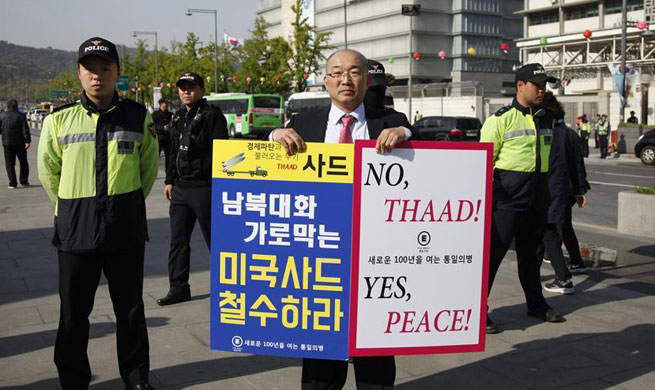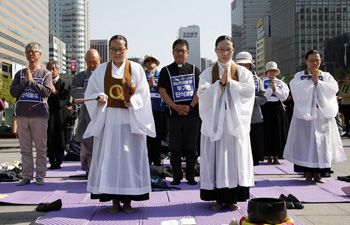by Marcelo Cajueiro
RIO DE JANEIRO, April 27 (Xinhua) -- The Brazilian government has taken actions to minimize the impact of a full workers' strike on Friday.
The strike was launched to protest against the government's reform of the social security system, which called for a major change in the retirement system and was expected to be voted on in the Senate next week, following the approval of the House of Representatives on late Wednesday.
Many regarded the initiative as being detrimental to workers' interests, as it required them to work for more years before retiring. However, the government said the reform was necessary to counter the growing deficit of the social security system.
The opposition retorted that the deficit was fabricated, and the reform would place all the burdens of the system on the workers while protecting the interests of the employers.
Over the past week, several labor unions declared they will have a 24-hour strike. In big cities, bank tellers, school teachers and even the police have announced their support for the move.
In order to minimize the negative impact of the strike, the central government said it will cut the income of any public employee failing to work on Friday because of the protest. The administrations of Rio and Sao Paulo are doing the same.
The Sao Paulo state government also announced it would increase the police force in the city, which many considered as an explicit threat to protesters.
The Brazilian law protects the freedom of protest, and the Chief Labor Prosecutor's Office, the top authority on labor law-related matters, said Thursday conducting a full strike is a legitimate right, and any retaliation is illegal.
It remains to be seen whether the government will be able to curb the strike though, as Brazilian senator Renan Calheiros said Thursday the "sloppy" labor reform will not get through the Senate.
Calheiros is affiliated to the Brazilian Democratic Movement Party (PMDB), the same party President Michel Temer belongs to.
"The reform is only interesting to the financial system, it was rejected in full and everywhere by the population ... it is an embarrassment to the ruling alliance," Calheiros said.
Under Brazilian law, if the Senate makes changes to the bill, it must be returned to the lower house for voting with new terms.
"It will come and go, backing off more and more," the senator said. "It intends to leave workers defenseless, condemned to accepting agreements which will lower their pay, cancel pay rises and take back guarantees."
Under the reform, the agreements between employers and workers would be above the labor law, which in practice means employers no longer have to follow the law if workers accept their conditions.
Analysts said that in a scenario of rising unemployment and recession, the reform will give employers much more pull in the negotiations, leaving workers unprotected by the law and labor courts.
"We all know that agreements were forced on in a time of recession, with 13 million unemployed and unemployment rates rising every month. It is like asking one to accept cruelty as if it was charity," the senator said.















